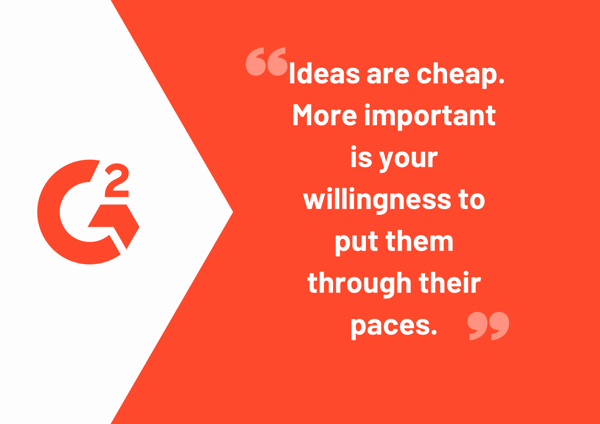Even the most passionate and driven content creators can feel overwhelmed when faced with the enormous number of shows available on podcast platforms.
The number of podcasts is growing at an astronomical rate; with over 550,000 unique shows on iTunes at the beginning of the year as well as Spotify’s announcement of its plan to invest over $500 million in developing their podcasting platform and offerings, the market seems like it’s crowded to the point of implosion.
However, the popularity of podcasts (and the ease of their creation) does not mean you should shy away from bringing your ideas to life. Instead, you should use a process to hone and refine your ideas into something that will stand out from the crowd and bring interested people into the orbit of your community or business.
4 steps for creating podcast ideas
- Brainstorm
- Develop an audience persona
- Research the market
- Decide on a format
The process for generating ideas for a podcast
Ideas are cheap. That’s the first thing many creatives will tell you when you ask them about their work. People have ideas for new projects — some wonderful and innovative, others a horrendous mess — all the time.
More important to the success of your podcasting endeavor is your willingness to put your ideas through their paces and spend the necessary time to uncover the diamond beneath the coarse and unformed exterior of the initial “gee-whiz!” moment.

The ‘creative process’ is seen as one of the more mystical elements of content creation. For years, people have espoused and reinforced the idea that only a select creative elite have the potential, the “it factor,” to create truly compelling work.
That belief is, quite frankly, a myth. All creatives take their work through a systematic process of some form or another, be it rigorous or well documented or something they are only loosely aware of.
Taking your idea through a structured creative process is one of the quickest and most effective ways to take that initial spark of interest and kindle it into a finished podcast. By adhering to a structure, you will be challenged to consider different aspects of your idea and how it interplays with the contemporary reality of the medium in which you want to work.
Brainstorm topics for your podcast
The first step to developing an excellent podcast is to start with what makes you uniquely suited to talk about whatever it is that interests you: your voice. While developing a voice is essential for communicating ideas in a way people will connect to, it’s doubly important for podcasting because it’s all you have.
What do you find exciting?
When undertaking an ongoing endeavor such as a podcast, you want to make sure your show is rooted in interests that will keep you passionate about your project for a good long while. It might seem painfully elementary, but a lot of people fall into the trap of working on projects they think they should make — usually inspired by some trend or hot new thing — instead of focusing on what they actually want to create.
What is something you know a lot about, something you could discuss for hours? Narrow down a topic you’re excited about when brainstorming podcast ideas.
What are your favorite podcasts?
What have you listened to in the past that made you think, “damn, I want to do something like that?” There’s a lot to be learned by examining our favorite shows and unpacking what made them so special to us.
For example, let’s say you wanted to make a true crime podcast and really loved Serial. You might notice that it focused on large themes such as love, death, and justice and used its weekly stories to highlight these big issues.
Of course, you don’t want to emulate a show exactly, but by considering what makes our favorite podcasts tick, we can learn the elements of good storytelling that can serve as tools to help us build our own unique shows.
Develop your audience persona
An audience persona is another critical element of creating a good podcast concept. Ask yourself: who do I want my podcast to appeal to? With podcasting’s downloadable and subscription-based model, it’s more effective to focus on a single topic or fill a specific niche.
As your audience persona takes shape, you’ll gain a better understanding of how to situate your podcast so that it will appeal to the people most likely to engage with it. Consider the following questions to help guide your thinking:
- What is the age range of my perspective listener base? What sort of experiences have they had?
- What do they care about? What answers could your podcast provide them?
- What are they seeking in their podcasting experience? Humor? Suspense? Information?
- What sort of obstacles has prevented my listeners from achieving their goals? How can I help them?
When you’re developing an audience persona, keep in mind that it isn’t an exact science and is simply meant to inform your ideation process. Ultimately, connecting with an audience is why anyone makes a podcast, so it’s well worth your time to understand who will find value in yours.
Research existing podcasts
Now that you know who would listen to your podcast, you want to consider the current landscape of podcasts within your specific topic. The best way to do this is to think about the topics that are being covered as broad conversations being had between different podcasts. You’ll want to figure out what that conversation is and then identify an area where you can add value by adding something new to the discussion.
It’s a good idea to not just focus on the podcasting scene; explore the other content that is being produced online about your topics such as blogs and YouTube videos. This will give you a better sense of what the conversation is about and will expose you to more methods and ideas of expression.
Understanding what the competition is doing will also give you a sense of what works and what doesn’t. If no one is doing anything like what you want to do, don’t hesitate to strike out on your own and try something new; however, make sure this lack of content isn’t because it’s been tried and just doesn’t work. A good place to start brainstorming is to think of strange or creative ideas for podcast segments and see where the wind takes you.
Select a podcast format
This part is a little trickier to evaluate and really depends on what you think the best way to convey the information to your audience will be. Do you think it’s something you know a lot about? A solo podcast is easy to set up and could be the right option for you. Maybe you want to call on multiple perspectives to delve into the topic, in which case, a co-hosted or interview podcast might be better. (for more on this, see: what is a podcast?)
You have a great idea…
...now make it so! Whether you have ten thousand ideas or are struggling to come up with a single one, putting your noggin through a creative process is sure to help you build a concept that will serve as the foundation for a podcast you actually want to make.
Looking for more information on podcasts? Check out our podcasting 101 guide for everything you could ask for!
 by Piper Thomson
by Piper Thomson
 by Piper Thomson
by Piper Thomson
 by Piper Thomson
by Piper Thomson